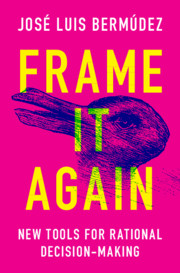Book contents
- Frame It Again
- Frame It Again
- Copyright page
- Contents
- Figures
- Tables
- Acknowledgments
- 1 Priming the Pump: Framing Effects and the Litany of Human Irrationality
- 2 Framing: The Classic Experiments
- 3 Where the Rubber Hits the Road: Investors, Frames, and Markets
- 4 Juliet’s Principle
- 5 Rational Frames?
- 6 Agamemnon and Climate Change
- 7 Framing Temptation and Reward: The Challenges of Self-Control
- 8 Chickens and Chariot Races: Framing in Game Theory
- 9 Fair’s Fair: Framing for Cooperation and Fairness
- 10 Getting Past No: Discursive Deadlock and the Power of Frames
- 11 Opening the Door to Non-Archimedean Reasoning
- Appendix Frames in the Brain
- Bibliography
- Index
4 - Juliet’s Principle
Published online by Cambridge University Press: 15 October 2020
- Frame It Again
- Frame It Again
- Copyright page
- Contents
- Figures
- Tables
- Acknowledgments
- 1 Priming the Pump: Framing Effects and the Litany of Human Irrationality
- 2 Framing: The Classic Experiments
- 3 Where the Rubber Hits the Road: Investors, Frames, and Markets
- 4 Juliet’s Principle
- 5 Rational Frames?
- 6 Agamemnon and Climate Change
- 7 Framing Temptation and Reward: The Challenges of Self-Control
- 8 Chickens and Chariot Races: Framing in Game Theory
- 9 Fair’s Fair: Framing for Cooperation and Fairness
- 10 Getting Past No: Discursive Deadlock and the Power of Frames
- 11 Opening the Door to Non-Archimedean Reasoning
- Appendix Frames in the Brain
- Bibliography
- Index
Summary
It’s time to take stock. We have seen many examples of framing effects. Some are nicely revealed in the laboratory. Others appear when we look closely at financial markets and investments. Still others run through everyday life. These framing effects have a reasonably well understood basis in the brain. They seem to be as real as real can be. So now we need to start tackling a fundamental issue. This has come up on many occasions, but up to now we have kept on putting it to one side. So far, we have focused on reporting framing effects and understanding what they involve. But, even though I have been trying to be dispassionate and neutral, it should be clear to everyone that framing effects have not had a good press. The issue for now, and it will occupy us in one form or other for the rest of this book, is whether and how this is justified. Are framing effects always a negative? Are people susceptible to them always irrational?
- Type
- Chapter
- Information
- Frame It AgainNew Tools for Rational Decision-Making, pp. 66 - 89Publisher: Cambridge University PressPrint publication year: 2020

